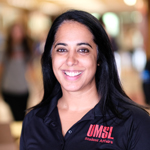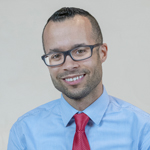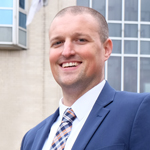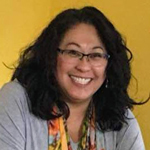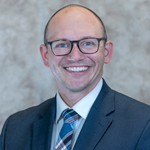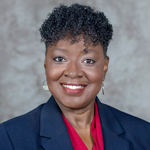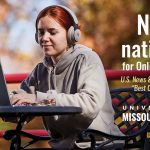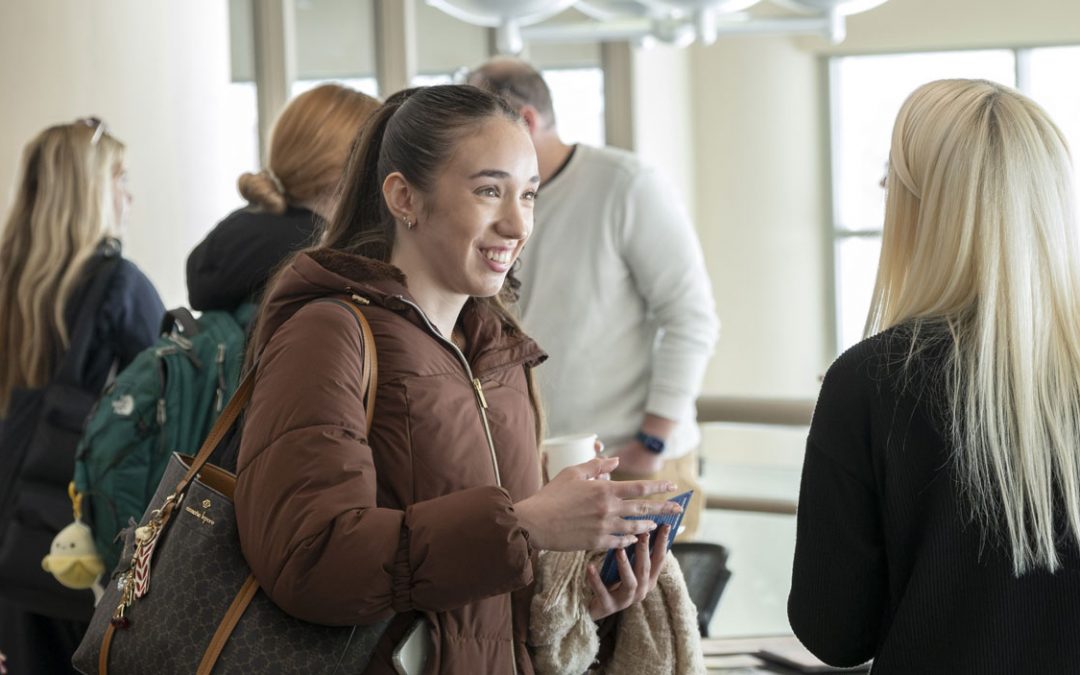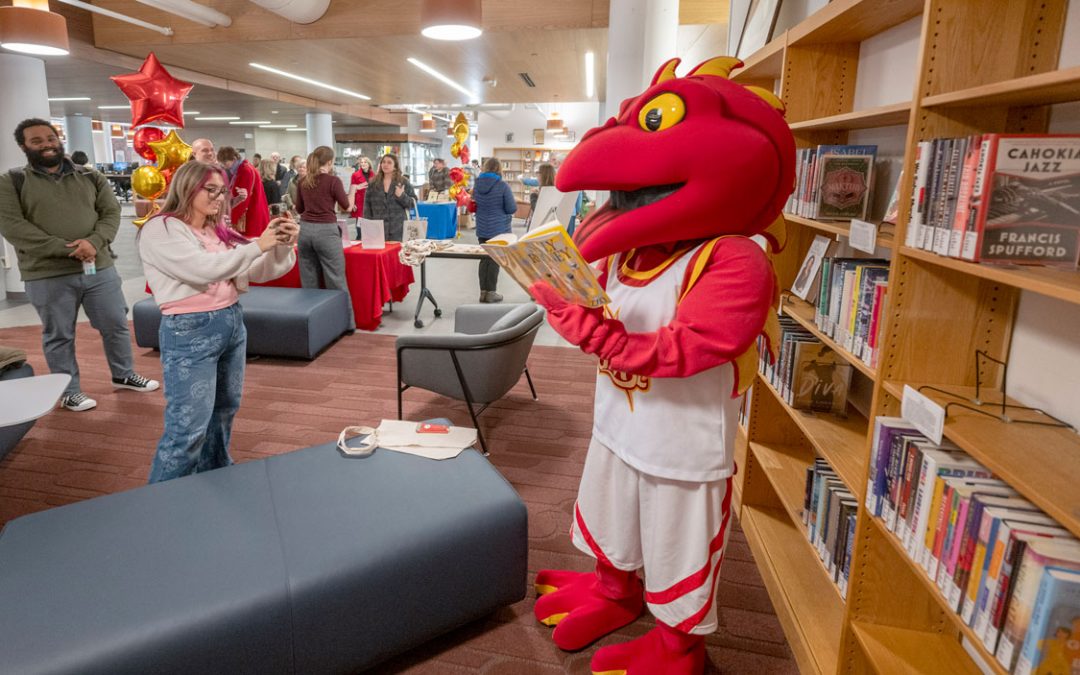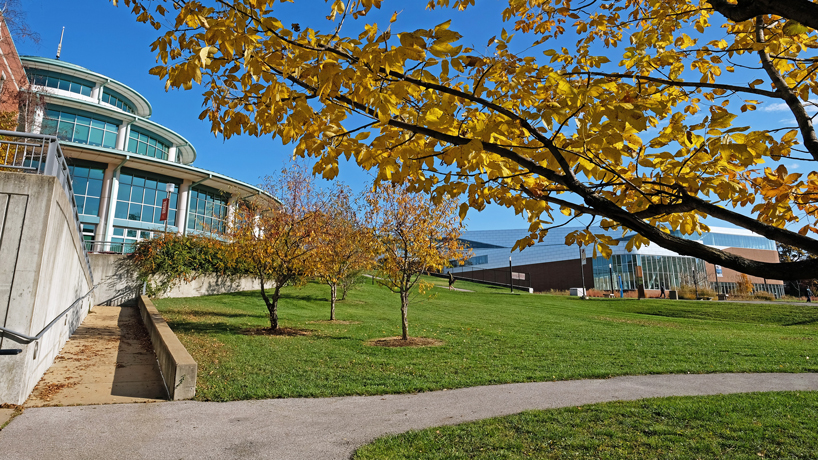
UMSL can be a model for others universities to emulate in metropolitan areas across the country. D’Andre Braddix, Robin Kimberlin, Will Werner, Karl Guenther, Prima Wagan and Natissia Small will be highlighting several university programs and initiatives over the next month as part of the Coalition of Urban and Metropolitan Universities Learning & Sharing Virtual Series. (Photo by August Jennewein)
The University of Missouri–St. Louis plays a vital role in St. Louis, providing educational opportunities to area residents of every background, driving workforce development throughout the region and directing the talent and expertise of its faculty, staff and students toward solving some of its biggest challenges.
The university can serve as a model for others to emulate in metropolitan regions across the country, so it’s fitting that UMSL staff members are behind five sessions in the Coalition of Urban and Metropolitan Universities Learning & Sharing Virtual Series being held this fall in place of CUMU’s annual conference.
The free, CUMU members-only program brings together CUMU administrators, faculty, staff, students and community partners to learn from one another and share challenges and successes on a set of discrete issue areas and provides practical takeaways.
“I am so pleased that many of our colleagues will be presenting in this series and showcasing UMSL talent, initiatives, actions and focus on being an anchor institution to our neighborhood and broader region,” Chancellor Kristin Sobolik said.
Faculty, staff members and students are invited to register and attend any of the sessions in the virtual series.
The UMSL-led sessions are:
Maximizing the Impact of Emergency Funding Distribution through a CARE and Financial Aid Partnership
Presenters: D’Andre Braddix & Robin Kimberlin
Date/Time: Tuesday, Nov. 9, noon-1 p.m.
The Higher Education Emergency Relief Fund has provided critical financial support to college students affected by the pandemic, but to maximize the impact of these funds universities have to be strategic and intentional in their outreach to students. This presentation will focus on how universities can more holistically support students by highlighting the collaboration of the the Office of Student Financial Aid and the UMSL Campus Assessment, Evaluation and Response – or CARE – team in emergency fund distribution. Braddix and Kimberlin will walk their audience through UMSL’s approach to distribute multiple rounds of CARES Act funding, including how they established clear and direct ways for students to identify additional needs and request extra support.
Recognizing there would be high motivation for students to fill out the HEERF form, they added a question into the application asking students whether they wanted to be contacted by a campus social worker about additional campus and community resources for the items they noted they needed HEERF funding for. If students were experiencing food insecurity and requested HEERF funds, they also helped students apply for SNAP benefits and gave them information on the Triton Pantry. If students stated they needed the funds for their housing, the CARE team also connected them with the rental and utility assistance services. During the second round of funding, UMSL sent additional resources to more than 400 students.
The presentation will explain each point at which they opened the opportunity for students to request additional support from a CARE case manager and how that follow-up was implemented. They will discuss why emergency financial assistance must be coupled with professional support to yield the best outcomes for students.
Mapping the Way to Effective and Equitable Policy
Presenters: Will Werner
Date/Time: Friday, Nov. 19, 1:30-2:30 p.m.
In 2024, the National Geospatial-Intelligence Agency will open its new $1.7 billion West headquarters on 97 acres in historic St. Louis Place, an underdeveloped neighborhood in north St. Louis with high levels of poverty and decades of disinvestment. N2W represents the largest federal investment in St. Louis history and will complement the existing NGA campus, located just a few miles away. The establishment of N2W arrives with tremendous potential to create a geospatial innovation hub in the St. Louis region, to grow diverse talent pipelines from our most underserved communities to meet the needs of geospatial employers, to advance geospatial research and entrepreneurism and to strengthen the neighborhoods surrounding N2W.
These opportunities are interconnected. To build a geospatial innovation hub, the region must take bold steps now to address critical skill gaps, to ensure equity and inclusion in talent pipelines, and to advance community-led development work in the neighborhoods surrounding N2W. UMSL’s Geospatial Collaborative is poised to be a driving force in helping the region realize its potential as the nation’s leading hub for geospatial innovation. Werner’s presentation will spotlight UMSL’s efforts to build capacity in underserved areas of the city, while developing opportunities for the youth that will be filling those critical jobs in the future. UMSL is having an impact on the geospatial ecosystem in several ways including, leading the partnership with NGA to develop effective K-16 educational programs, working to develop the next generation of geospatial professionals and creating research projects in diverse fields of study, illustrating the ubiquity of geospatial techniques and their impact.
The St. Louis Anchor Action Network: Using Data Tools
Presenters: Karl Guenther & Prima Wagan
Date/Time: Tuesday, Nov. 30, noon- 1 p.m.
St. Louis has long-standing patterns of racial and economic segregation rooted in systemic racism. The St. Louis Anchor Action Network aims to increase employment, income and wealth through intentional action by major anchors in the St. Louis region. STLAAN includes eleven institutions, including major institutions of higher education and health care in the St. Louis region along with the Saint Louis Zoo and Edward Jones. STLAAN has identified a focus geography covering all census tracts in St. Louis City and County with poverty rates over 20% that are majority Black. In this geography, 24.1% of the population live below the poverty line compared with 11.3% of the region. The footprint is 70% Black, and includes 50% of the region’s unemployed Black residents.
A network, not a new organization, STLAAN connect jobs and business contracts in the footprint. To support the work of member institutions, UMSL and network partners developed a data tool to help institutions identify, maximize and facilitate relationships with local businesses. Such a tool helps institutions develop more appropriate forms of intervention to fill existing capacity gaps and, therefore, address existing barriers – both perceived and real – to working with local MWBEs. Guenther and Wagan’s presentation will focus on this searchable data tool as a resource for relationship building and developing systems of accountability in promoting supplier diversity and inclusion.
Best Practices for College Access Programming: Past, Present, and National Pandemic
Presenter: Natissia Small
Date/Time: Tuesday, Dec. 7, 1-2 p.m.
College access providers continue to serve in a critical role for providing supports to promote high school completion and college matriculation. The award-winning UMSL Bridge Program has received state, local and national recognition for college access supports provided to the St. Louis community. Started in 1986, the program has served those from a range of academic backgrounds – public schools, private schools and homeschooled – and from every racial, ethnic and socioeconomic group. Since 2003, 100% of students who have completed the Bridge Program have matriculated to college. This session will provide attendees with best practices utilized to maintain effective college access supports while enhancing services to middle and high school students.

